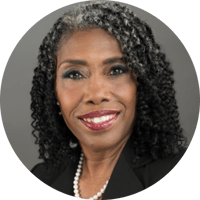Leaders in Lending | Ep. 93
Credit Unions Driving Racial Equity
In this episode, Renée Sattiewhite, President & CEO of the African American Credit Union Coalition, highlights her strategies for driving equity and bridging the racial wealth gap, addressing the housing and credit disparities and ensuring access and fairness.


GUEST SPEAKER
Renée Sattiewhite
Renée Sattiewhite is the President and CEO of the African-American Credit Union Coalition (AACUC) and is responsible for the execution of the strategic vision of the Board of Directors. With over 30 years in the world of finance, she started her career as a teller trainee for City National Bank in Beverly Hills, California. She quickly moved up the ranks with various positions including bank officer. She has been associated with credit unions for over 25 years and was the first Internship Program Director for the AACUC. Renée’s background is in training and marketing, specializing in customer service, effective communication, board development, team building and strategic planning.

ABOUT
African-American Credit Union Coalition (AACUC)
The African-American Credit Union Coalition (AACUC) was created to increase the strength of the global credit union community. They are a non-profit organization of diverse, multicultural professionals and volunteers in the credit union industry. The AACUC is an award-winning organization shaping diversity, equity, and inclusion in the credit union movement. AACUC is considered a leader in the credit union industry, adopting the 8th Cooperative Principle of Diversity, Equity and Inclusion and providing knowledge of how credit unions can become more diverse and inclusive. The National Credit Union Foundation Board of Directors awarded AACUC the 2022 Anchor Award, a rare and prestigious honor that stands apart from the Herb Wegner Memorial Awards, which is given to individuals and organizations that have shown incredible leadership and anchored the credit union industry through moments of great adversity.
Key Topics Covered
- The African American Credit Union Coalition and its goals
- The scalability of service to your staff and members
- How to address equity gaps in the traditional banking system
- Overcoming bias through community representation

“I'm the possibility of people serving other people passionately.”

“If you take care of your staff, the staff will take care of your people.”

“Through commitment to change, credit unions will unite and eradicate racism.”
EPISODE RECAP & SUMMARY
Credit Unions, at their core, have a strong commitment to service. But how can they scale this to the broader community? Our guest today believes that if you serve people passionately, you will ultimately move the entire industry forward toward more inclusivity.
In this episode, Renée Sattiewhite, President & CEO of the African American Credit Union Coalition, highlights her strategies for driving equity and bridging the racial wealth gap, addressing the housing and credit disparities and ensuring access and fairness.
Join us as Jeff and Renée discuss:
- The African American Credit Union Coalition and its goals
- The scalability of service to your staff and members
- How to address equity gaps in the traditional banking system
- Overcoming bias through community representation
The African American Credit Union Coalition (AACUC) and its goals
Before heading the AACUC as President and CEO, Sattiewhite worked in banking, an experience she attributes to fostering a personal commitment to great customer service. This value for service would eventually evolve into a foundation for AACUC as the nonprofit would grow to provide advocacy and professional development for its members and beyond.
As an inclusive coalition, the AACUC invites everyone to be a part of the AACUC.
“The industry as we know it is largely without color if you will,” Sattiewhite said. “So the AACUC seeks to make sure that everyone understands what African Americans bring to the table and how we can do better as a whole unit.”
Although the AACUC seeks to serve its members, they also believe there is an obligation to serve on a larger scale to move the world towards greater equity.
The scalability of service to your staff and members
For Sattiewhite, service goes beyond a surface level and has effects far outside your immediate network.
“I’m the possibility of people serving other people passionately,” she said. “ I believe that if we all did that, we could change the planet.”
Serving others passionately starts with showing them you truly care about them. Sattiewhite offers a few requirements for genuine, passionate service:
- Listen to people
- Make sure staff and members know they’re appreciated
- Have grace when people make mistakes
- Understand the various potential personal factors that can influence work
Above all else, serving those around you begins with being really intentional about being present with people. Before you can scale to truly serve your members and other stakeholders, you have to take care of your staff.
“If you take care of your staff, the staff will take care of your people,” Sattiewhite said. “After that, it’s all about scalability.”
Scaling service beyond staff goes back to the critical principle of being intentional about who you’re serving, knowing who they are and what their interests and needs are.
Addressing equity gaps in the traditional banking system
Often, systems within the traditional banking system are not designed to serve every community, particularly those in historically underserved populations.
In the world of lending and banking, underserved communities often have historically difficult access to credit and therefore have lower credit scores meaning that low-risk profile lenders do not offer service based on systemic patterns — not intentionally denying communities access, but doing so regardless by considering only traditional conditions.
Breaking these patterns by ensuring that communities of color have access to credit without predatory interest rates is one of the first steps to building equity into lending.
Overcoming bias through community representation
Changing to offer greater equity requires inclusion.
“When you expand and invite people of color into the conversation, they can offer the information you need to change,” Sattiewhite said.
Decisions can only be made based on the experiences of those with a seat at the table. Most people have a strong bias toward their own experiences and fail to comprehend the perspectives of those from different backgrounds. And without a strong grasp on these diverse perspectives, you cannot serve or create products that serve people with experiences different from your own.
Without diverse representation in leadership and decision-making, changes that foster equity will not happen.
Stay tuned for new episodes every week on the Leaders in Lending Podcast.





